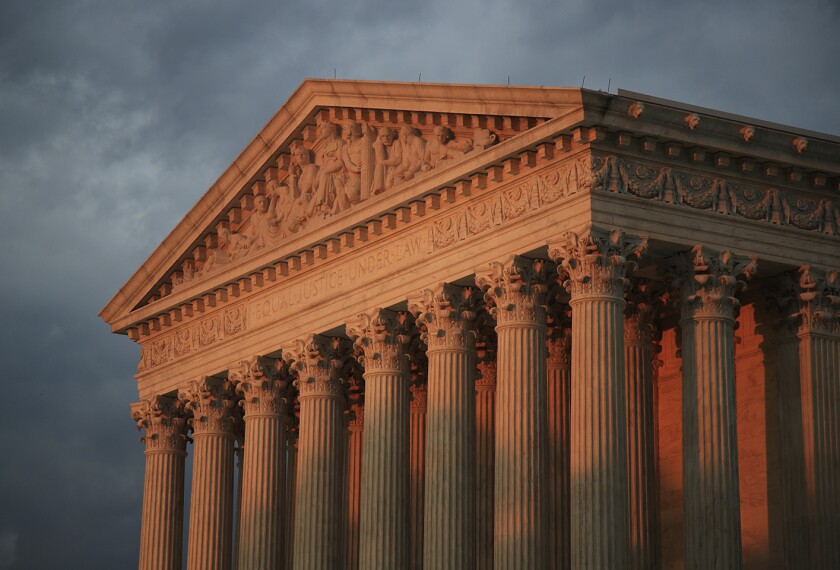The U.S. Supreme Court is seeking to use a lawsuit over peer sexual harassment on a Massachusetts school bus to resolve an important legal issue about which federal laws are available to combat gender discrimination in education.
The question for the justices during much of the oral arguments today was whether they granted review of the right case to resolve that issue. Much of the hourlong arguments in Fitzgerald v. Barnstable School Committee (Case No. 07-1125) were spent debating whether parents who sued a school district over their daughter’s harassment by another student could possibly win under a constitutional claim when they have already lost under Title IX of the Education Amendments of 1972, the federal law that prohibits sex discrimination in federally funded schools and colleges.
The issue for the court is whether Title IX provides the exclusive remedy for sex-discrimination claims in education, as the U.S. Court of Appeals for the 1st Circuit, in Boston, ruled last year in the case, or whether alleged discrimination victims may also sue under a broader federal civil rights law known as Section 1983. That law, dating from the Reconstruction era, allows plaintiffs to sue individuals who violate their constitutional or statutory rights under color of law.
“Congress did not mean Title IX to preclude the use of Section 1983 to enforce the Constitution,” Charles A. Rothfeld, a Washington lawyer representing the Massachusetts family, told the justices.
But Kay H. Hodge, a Boston lawyer representing the Barnstable, Mass., school district, said that in the area of sex discrimination, Congress established a comprehensive enforcement scheme under Title IX.
For the type of peer sexual harassment alleged in this case, Ms. Hodge said, “if you were going to allow additional claims under Section 1983 against the institution, it would intrude and interfere with the school’s processes of disciplining students.”
Harassment on the Bus
The case arises from claims that a kindergarten girl was subjected to sexual harassment by a 3rd grade boy while riding the bus to school in the 2000-01 academic year. Each time the girl wore a dress to school, the boy allegedly forced her to lift her skirt, pull down her pants, and spread her legs, according to court papers.

The 4,460-student Barnstable district and local police investigated the charges, but the police found there was insufficient evidence to proceed with any criminal charges against the 3rd grader, court papers say.
The district offered to place the girl on another bus—a proposal that dissatisfied her parents because they felt it was a form of punishing the victim. They requested that the alleged harasser be removed from their daughter’s bus or that an adult monitor ride the bus.
The school district says in its legal papers that because it had trouble substantiating the kindergartner’s allegations, offering to place her on another bus was a reasonable response to the alleged peer harassment.
The parents sued the district under both Title IX and Section 1983. Both a federal district court and the 1st Circuit appeals court ruled that the family could not prevail under Title IX because the school district did not act with “deliberate indifference” to the complaints, which is the standard under the Supreme Court’s decisions on district liability for sexual harassment of students. The courts went on to rule that the Section 1983 claim, which alleged that the girl’s 14th Amendment equal-protection rights were violated, was foreclosed by Title IX.
The 1st Circuit court noted in its 2007 opinion that besides itself, three other federal circuit courts have ruled that Title IX forecloses Section 1983 constitutional claims. But three other federal circuit courts have ruled that both Title IX and Section 1983 claims may both be raised in a sex-discrimination suit.
An Unusually Quiet Court
Ms. Hodge, the school district’s lawyer, spent considerable time arguing that the Fitzgerald family could not win its case on a Section 1983 constitutional claim, even if such a claim were available to them.
“The plaintiffs offer no theory of liability under the equal-protection clause other than the defendants’ supposed failure to take adequate actions to prevent and/or remediate the peer-on-peer harassment that [the girl] experienced,” Ms. Hodge said.
Mr. Rothfeld, the family’s lawyer, said that the lower courts cut off the family’s Section 1983 claims so early that they could not be properly developed.
“We think that one thing that could be developed and explored further is disparate treatment of complaints,” Mr. Rothfeld said. “For example, the treatment of complaints of bullying by boys more favorably perhaps than by girls, believing testimony of boys rather than believing testimony of girls.”
He called on the justices to rule for the family on the narrow legal issue—in other words, to rule that Title IX does not provide the exclusive legal remedy for sex discrimination in education—then to return the family’s case to the lower courts so it can pursue the constitutional claim.
With all the debate over the suitability of the case, few justices tipped their hands about the main legal question. Some normally active questioners didn’t speak at all. But Justice Antonin Scalia suggested to Ms. Hodge that he thought the court ought to decide “the split that now exists in the federal courts over whether Title IX precludes the use of [Section] 1983.”
“That is an important question. It’s why we took the case,” he said. “Why can’t we decide that issue and then for all these loose ends, send it back to the court of appeals?”
Justice Ruth Bader Ginsburg aggressively questioned both sides, but she seemed to press Ms. Hodge more about the potential lack of protection that would result if Section 1983 constitutional claims were not available to sex-discrimination plaintiffs.
“You are leaving out something quite glaring in that respect,” Justice Ginsburg said. “For example, single-sex schools, military academies, admissions to elementary and high schools are not covered by Title IX.”
The case is expected to be decided by the end of the court’s term in June.





